Unit 2 Good Health to You! Lesson7 ~Lesson9 复习课件
文档属性
| 名称 | Unit 2 Good Health to You! Lesson7 ~Lesson9 复习课件 | 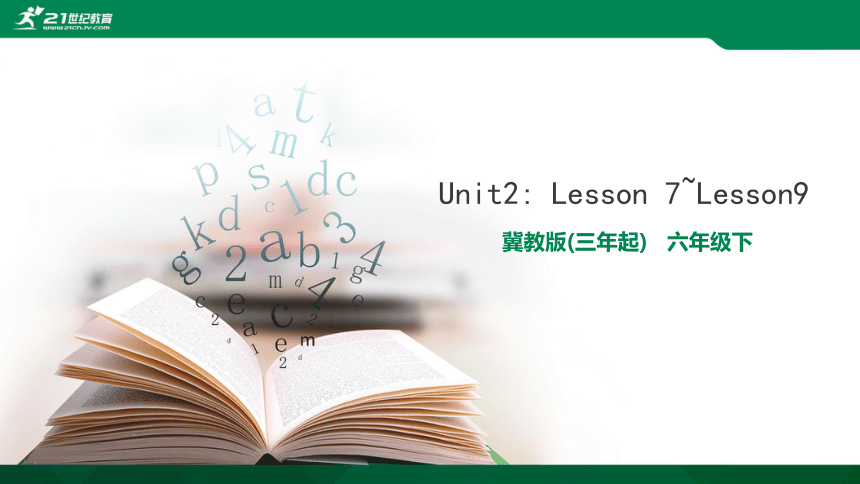 | |
| 格式 | zip | ||
| 文件大小 | 2.6MB | ||
| 资源类型 | 试卷 | ||
| 版本资源 | 冀教版(三年级起点) | ||
| 科目 | 英语 | ||
| 更新时间 | 2020-02-28 08:27:56 | ||
图片预览

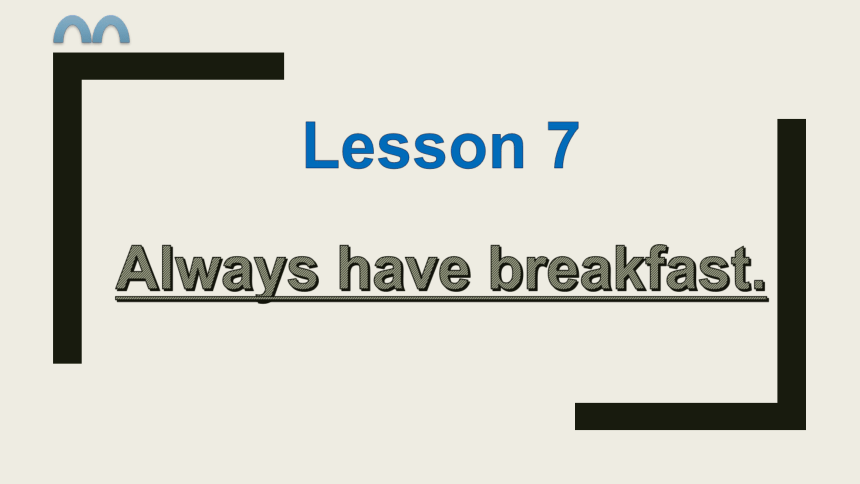
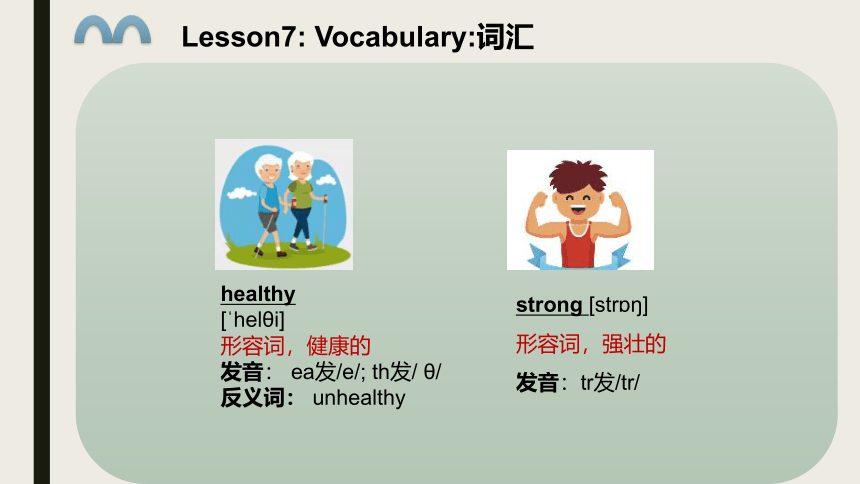
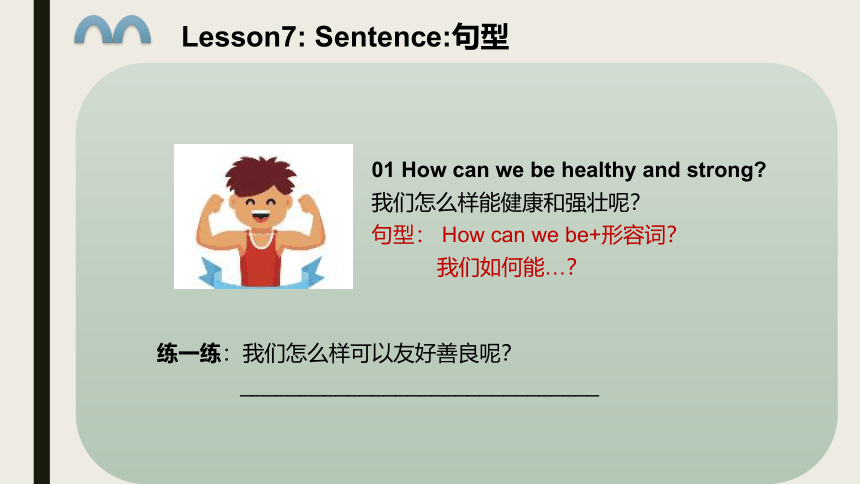
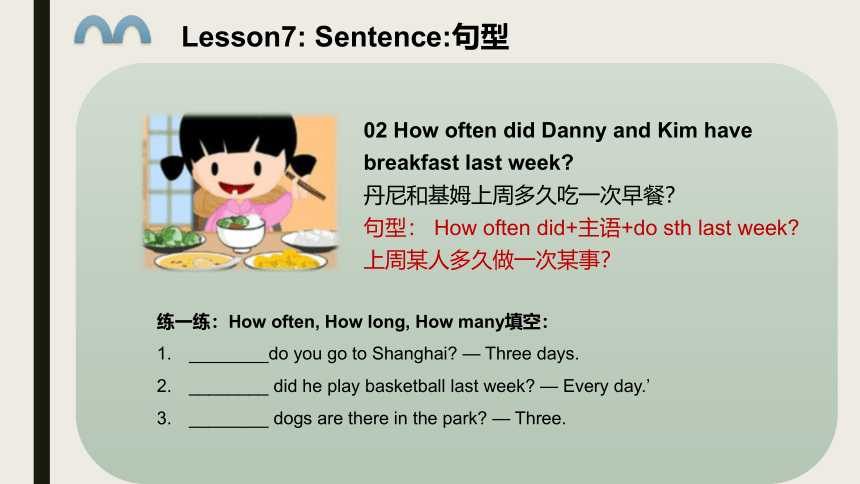
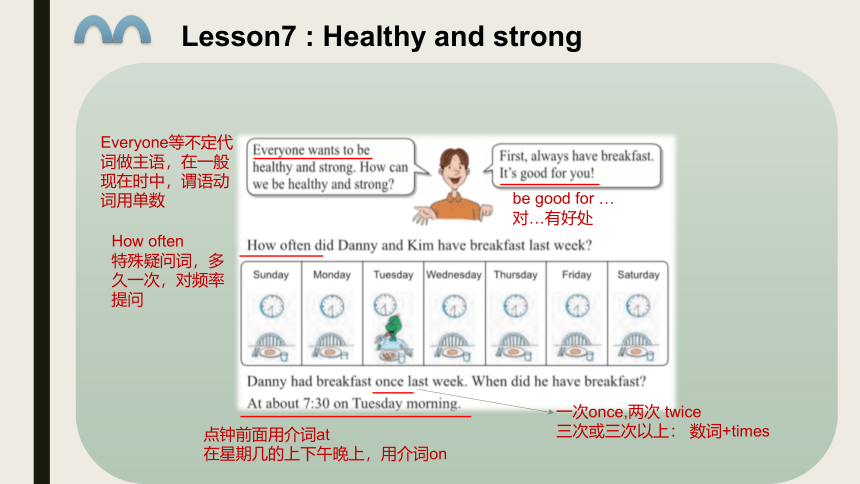
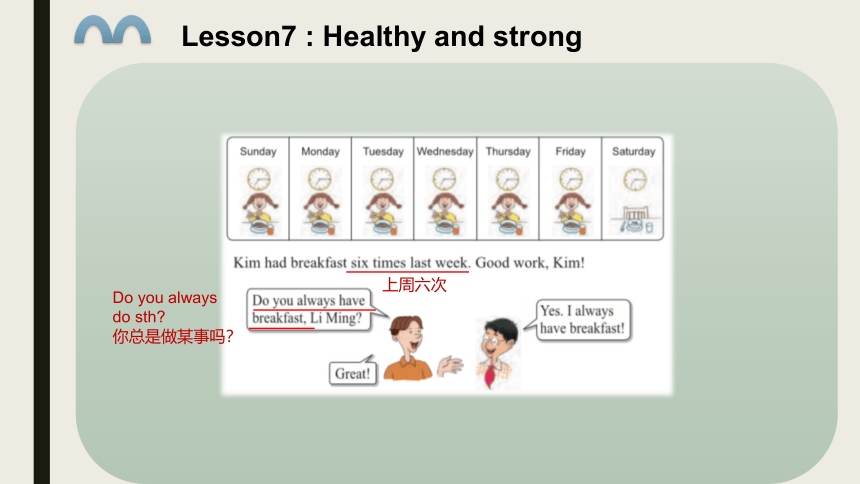
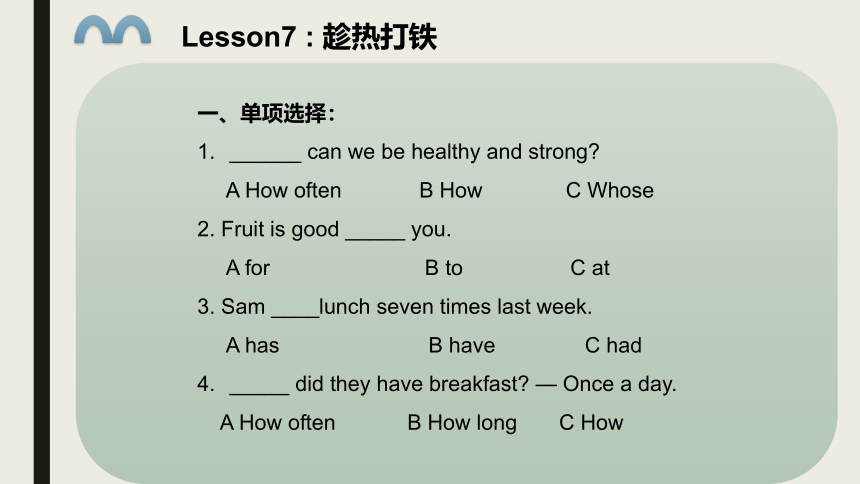
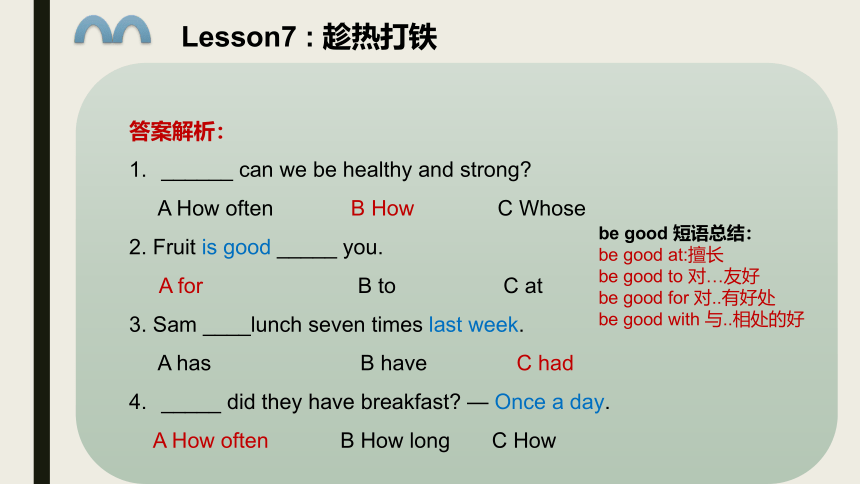
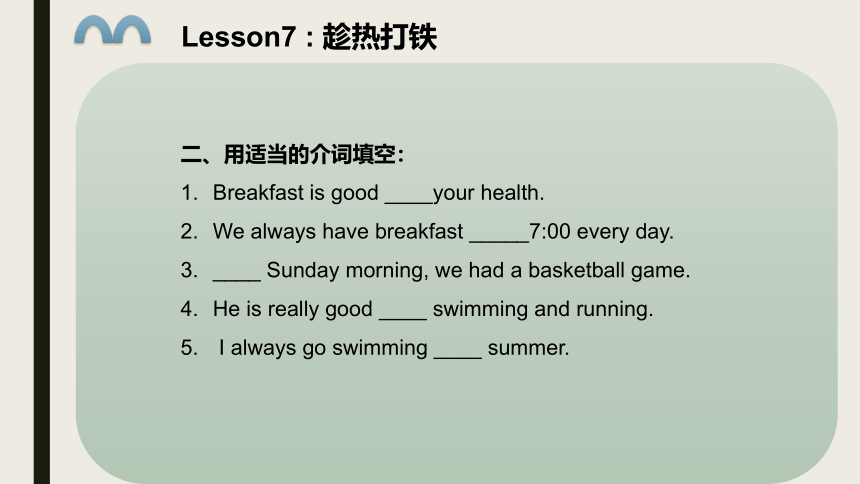
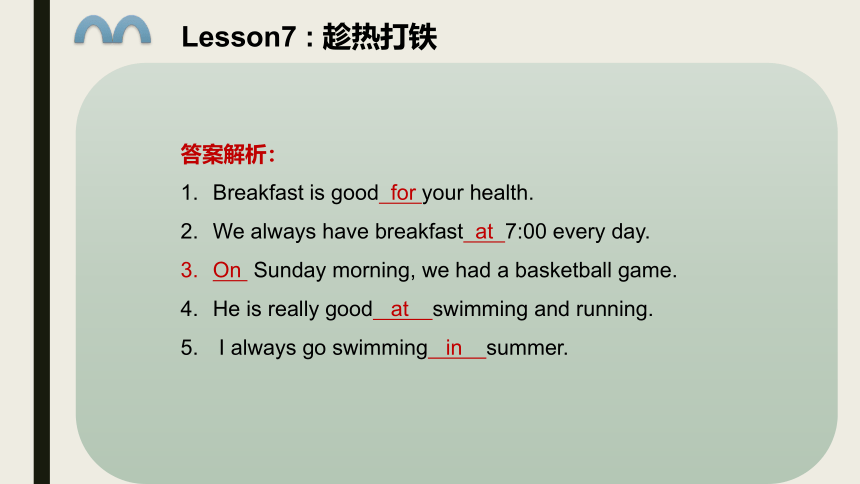
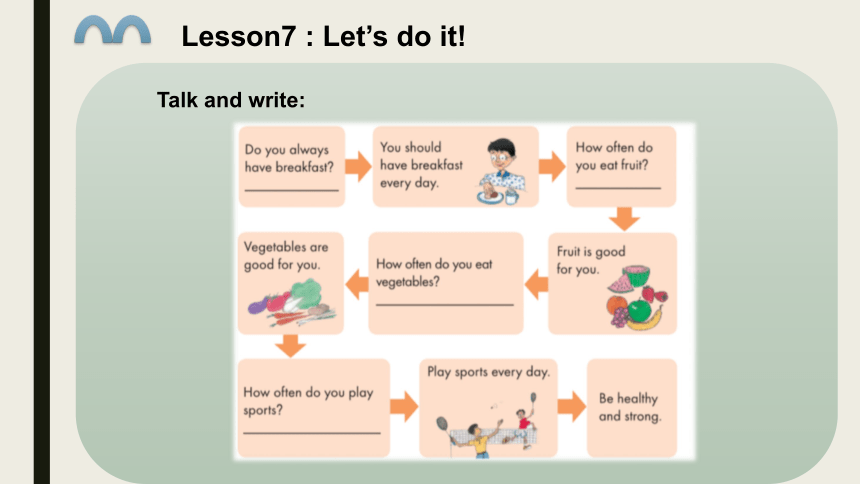
文档简介
(共42张PPT)
Unit2: Lesson 7~Lesson9
冀教版(三年起) 六年级下
Lesson 7
Always have breakfast.
Lesson7: Vocabulary:词汇
healthy
[?helθi]
形容词,健康的
发音: ea发/e/; th发/ θ/
反义词: unhealthy
strong [str??]
形容词,强壮的
发音:tr发/tr/
Lesson7: Sentence:句型
01 How can we be healthy and strong?
我们怎么样能健康和强壮呢?
句型: How can we be+形容词?
我们如何能…?
练一练:我们怎么样可以友好善良呢?
______________________________
Lesson7: Sentence:句型
02 How often did Danny and Kim have breakfast last week?
丹尼和基姆上周多久吃一次早餐?
句型: How often did+主语+do sth last week?
上周某人多久做一次某事?
练一练:How often, How long, How many填空:
________do you go to Shanghai? — Three days.
________ did he play basketball last week? — Every day.’
________ dogs are there in the park? — Three.
Lesson7 : Healthy and strong
Everyone等不定代词做主语,在一般现在时中,谓语动词用单数
be good for …
对…有好处
How often
特殊疑问词,多久一次,对频率提问
一次once,两次 twice
三次或三次以上: 数词+times
点钟前面用介词at
在星期几的上下午晚上,用介词on
Lesson7 : Healthy and strong
上周六次
Do you always do sth?
你总是做某事吗?
Lesson7 : 趁热打铁
一、单项选择:
______ can we be healthy and strong?
A How often B How C Whose
2. Fruit is good _____ you.
A for B to C at
3. Sam ____lunch seven times last week.
A has B have C had
_____ did they have breakfast? — Once a day.
A How often B How long C How
Lesson7 : 趁热打铁
答案解析:
______ can we be healthy and strong?
A How often B How C Whose
2. Fruit is good _____ you.
A for B to C at
3. Sam ____lunch seven times last week.
A has B have C had
_____ did they have breakfast? — Once a day.
A How often B How long C How
be good 短语总结:
be good at:擅长
be good to 对…友好
be good for 对..有好处
be good with 与..相处的好
Lesson7 : 趁热打铁
二、用适当的介词填空:
Breakfast is good ____your health.
We always have breakfast _____7:00 every day.
____ Sunday morning, we had a basketball game.
He is really good ____ swimming and running.
I always go swimming ____ summer.
Lesson7 : 趁热打铁
答案解析:
Breakfast is good for your health.
We always have breakfast at 7:00 every day.
On Sunday morning, we had a basketball game.
He is really good at swimming and running.
I always go swimming in summer.
Lesson7 : Let’s do it!
Talk and write:
Lesson7 :随堂练习
按要求写句子:
Kim plays ping-pong twice a week.(对划线部分提问)
________________________
2. Jenny has breakfast at seven every day.(改成一般过去时)
________________________
3. Jenny had breakfast at seven last week.(对划线部分提问)
_________________________
4. I always have breakfast.(变一般疑问句)
___________________________
Lesson7 :随堂练习
答案解析:
Kim plays ping-pong twice a week.(对划线部分提问)
How often does Kim play ping-pong?
2. Jenny has breakfast at seven every day.(改成一般过去时)
Jenny had breakfast at seven last week.
3. Jenny had breakfast at seven last week.
When did Jenny have breakfast last week?
4. I always have breakfast.(变一般疑问句)
Do you always have breakfast?
Lesson7: Summary:总结
掌握重点单词:health strong
掌握重要知识点: how often:对频率提问,多久一次;
be good+介词,短语的辨析;时间介词用法的回顾;everyone做主语,谓语动词用单数形式.
掌握重点句型:
How often did you have breakfast last week?
I always have breakfast at 7:30.
Lesson 8
Always brush your teeth.
Lesson8: Vocabulary: 词汇
before [b??f??(r)]
介词,连词,在…以前
发音:or发/??/
after [?ɑ?ft?(r)]
介词,连词,在…以后
发音:er发/?/
Lesson8: Before and after
表达主语习惯性动作或状态时,用一般现在时
当主语是第三人称单数时,谓语动词用单三.
wash hands
洗手
brush teeth
刷牙
be bad for..
对..有害处
Lesson8: Jenny’s week
five times a week: 每周5次
from…to…从…到…
表达衔接词:
First:首先
Next: 接下来Then: 然后
当时间名词前有限定词修饰时,时间介词用on
Lesson8: 趁热打铁
用所给单词的适当形式填空:
Lily _____(go) to school five days a week.
Bob ______(not) go shopping.
She washes ______(she) clothes.
I want strong and healthy _____(tooth).
Hot dogs are _______(good) for you.
Lesson8: 趁热打铁
答案解析:
Lily goes (go) to school five days a week.
Bob doesn’t (not) go shopping.
She washes her (she) clothes.
I want strong and healthy teeth (tooth).
Hot dogs are bad (good) for you.
Lesson8: 趁热打铁
根据汉语意思填写单词:
戴维从周一到周五去上学.
David goes to school _____ Monday _____ Friday.
2. 他们在学校总是努力学习。
They _____ work _____ _____ school.
3.他早餐后做什么?
What _____ he do ____ _____?
4. 那对他的牙齿不好。
That’s ____ ____his teeth.
5. 他晚饭后从来不刷牙.
He ____ ____ his teeth ____ _____.
Lesson8: 趁热打铁
答案解析:
戴维从周一到周五去上学.
David goes to school from Monday to Friday.
2. 他们在学校总是努力学习。
They always work hard at school.
3.他早餐后做什么?
What does he do after breakfast ?
4. 那对他的牙齿不好。
That’s bad for his teeth.
5. 他晚饭后从来不刷牙.
He never brushes his teeth after dinner.
Lesson8 : Summary:总结
掌握重要句型:
He washes his hands and face at 7:00 in the morning.
He brushes his teeth before breakfast.
He goes to school after breakfast.
能够熟练表达一天的活动:
wash hands and face, brush teeth, have breakfast, go to school, have classes,have lunch, after school, do my homework, have dinner, go to bed等.
Lesson 9
Eat more vegetables and fruits.
Lesson9: Vocabulary:词汇
vegetable [?ved?t?bl]名词,蔬菜
记忆:vege+table
meat [mi?t]
名词,肉
发音:ea发/i?/
Lesson9: Vocabulary:词汇
fruit [fru?t]
名词,水果
donut [?d??n?t]
名词,甜甜圈
Lesson9 :Let’s get to work.
01 How often: 多久一次
答语:twice a week: 一周两次
three times a week 一周三次
twice a day 一天两次
即:次数+a+时间名词
02 need to do sth:
需要做某事
Lesson9 :Let’s get to work.
一天一个苹果,远离医生
keep…away 远离…
Lesson9: 趁热打铁
单项选择:
1. How often does Kitty ____vegetables?
A eat B eats C to eat
2. I eat _____ and _____.
A potato; tomato B potatos; tomatos C potatoes; tomatoes
3. How often do you eat donuts? — Three ____ a week.
A time B times C once
4. What’s _____ favorite food?
A you B your C yours
5. An apple a day _____ the doctor away.
A keep B to keep C keeps
Lesson9: 趁热打铁
答案解析:
1. How often does Kitty ____vegetables?
A eat B eats C to eat
2. I eat _____ and _____.
A potato; tomato B potatos; tomatos C potatoes; tomatoes
3. How often do you eat donuts? — Three ____ a week.
A time B times C once
4. What’s _____ favorite food?
A you B your C yours
5. An apple a day _____ the doctor away.
A keep B to keep C keeps
Lesson9: 趁热打铁
按要求完成下列各题:
My favorite food is chicken.(对划线部分提问)
______________________
2. I like apples.(变否定句)
______________________
3. I eat potatoes twice a week.(对划线部分提问)
_______________________
4. How often do you eat vegetables?(根据实际回答)
_______________________
Lesson9: 趁热打铁
答案解析:
My favorite food is chicken.(对划线部分提问)
What’s your favorite food?
2. I like apples.(变否定句)
I don’t like apples.
3. I eat potatoes twice a week.(对划线部分提问)
How often do you eat potatoes?
4. How often do you eat vegetables?(根据实际回答)
I eat vegetables three times a week.
Lesson9: Let’s do it!
Lesson9: 随堂练习
一、根据提示选词填空:
food ping-pong milk watermelon day
grape sports fish year juice
1.( )--meat--( )--chicken
fruit– ( )--banana--( )
( )--basketball--( )--football
drink--( )-- water--( )
time-- ( )--( )--week
Lesson9: 随堂练习
答案解析:
food ping-pong milk watermelon day
grape sports fish year juice
1.( food )--meat--( fish )--chicken
fruit– ( grape )--banana--( watermelon )
( sports )--basketball--( ping-pong )--football
drink--( juice )-- water--( milk )
time-- ( day )--( year )--week
Lesson9: 随堂练习
二、按要求写单词:
health (形容词)__________
after(反义词)____________
tooth(复数)_____________
bad(反义词)_____________
potato(复数)_____________
一周2次(汉译英)__________
Lesson9: 随堂练习
答案解析:
health (形容词) healthy
after(反义词) before
tooth(复数) teeth
bad(反义词) good
potato(复数) potatoes
一周2次(汉译英) twice a week
Lesson 9: Summary:总结
掌握常见搭配:
Once/twice/ three times… a day/week/month/year
掌握重要句型:
How often do you eat vegetables? Three times a week.
What’s your favorite food/ fruit/ sports?
掌握 need的用法:
need to do sth :需要做某事
Thank you!
谢谢
21世纪教育网(www.21cnjy.com) 中小学教育资源网站
有大把高质量资料?一线教师?一线教研员?
欢迎加入21世纪教育网教师合作团队!!月薪过万不是梦!!
详情请看:
https://www.21cnjy.com/help/help_extract.php
Unit2: Lesson 7~Lesson9
冀教版(三年起) 六年级下
Lesson 7
Always have breakfast.
Lesson7: Vocabulary:词汇
healthy
[?helθi]
形容词,健康的
发音: ea发/e/; th发/ θ/
反义词: unhealthy
strong [str??]
形容词,强壮的
发音:tr发/tr/
Lesson7: Sentence:句型
01 How can we be healthy and strong?
我们怎么样能健康和强壮呢?
句型: How can we be+形容词?
我们如何能…?
练一练:我们怎么样可以友好善良呢?
______________________________
Lesson7: Sentence:句型
02 How often did Danny and Kim have breakfast last week?
丹尼和基姆上周多久吃一次早餐?
句型: How often did+主语+do sth last week?
上周某人多久做一次某事?
练一练:How often, How long, How many填空:
________do you go to Shanghai? — Three days.
________ did he play basketball last week? — Every day.’
________ dogs are there in the park? — Three.
Lesson7 : Healthy and strong
Everyone等不定代词做主语,在一般现在时中,谓语动词用单数
be good for …
对…有好处
How often
特殊疑问词,多久一次,对频率提问
一次once,两次 twice
三次或三次以上: 数词+times
点钟前面用介词at
在星期几的上下午晚上,用介词on
Lesson7 : Healthy and strong
上周六次
Do you always do sth?
你总是做某事吗?
Lesson7 : 趁热打铁
一、单项选择:
______ can we be healthy and strong?
A How often B How C Whose
2. Fruit is good _____ you.
A for B to C at
3. Sam ____lunch seven times last week.
A has B have C had
_____ did they have breakfast? — Once a day.
A How often B How long C How
Lesson7 : 趁热打铁
答案解析:
______ can we be healthy and strong?
A How often B How C Whose
2. Fruit is good _____ you.
A for B to C at
3. Sam ____lunch seven times last week.
A has B have C had
_____ did they have breakfast? — Once a day.
A How often B How long C How
be good 短语总结:
be good at:擅长
be good to 对…友好
be good for 对..有好处
be good with 与..相处的好
Lesson7 : 趁热打铁
二、用适当的介词填空:
Breakfast is good ____your health.
We always have breakfast _____7:00 every day.
____ Sunday morning, we had a basketball game.
He is really good ____ swimming and running.
I always go swimming ____ summer.
Lesson7 : 趁热打铁
答案解析:
Breakfast is good for your health.
We always have breakfast at 7:00 every day.
On Sunday morning, we had a basketball game.
He is really good at swimming and running.
I always go swimming in summer.
Lesson7 : Let’s do it!
Talk and write:
Lesson7 :随堂练习
按要求写句子:
Kim plays ping-pong twice a week.(对划线部分提问)
________________________
2. Jenny has breakfast at seven every day.(改成一般过去时)
________________________
3. Jenny had breakfast at seven last week.(对划线部分提问)
_________________________
4. I always have breakfast.(变一般疑问句)
___________________________
Lesson7 :随堂练习
答案解析:
Kim plays ping-pong twice a week.(对划线部分提问)
How often does Kim play ping-pong?
2. Jenny has breakfast at seven every day.(改成一般过去时)
Jenny had breakfast at seven last week.
3. Jenny had breakfast at seven last week.
When did Jenny have breakfast last week?
4. I always have breakfast.(变一般疑问句)
Do you always have breakfast?
Lesson7: Summary:总结
掌握重点单词:health strong
掌握重要知识点: how often:对频率提问,多久一次;
be good+介词,短语的辨析;时间介词用法的回顾;everyone做主语,谓语动词用单数形式.
掌握重点句型:
How often did you have breakfast last week?
I always have breakfast at 7:30.
Lesson 8
Always brush your teeth.
Lesson8: Vocabulary: 词汇
before [b??f??(r)]
介词,连词,在…以前
发音:or发/??/
after [?ɑ?ft?(r)]
介词,连词,在…以后
发音:er发/?/
Lesson8: Before and after
表达主语习惯性动作或状态时,用一般现在时
当主语是第三人称单数时,谓语动词用单三.
wash hands
洗手
brush teeth
刷牙
be bad for..
对..有害处
Lesson8: Jenny’s week
five times a week: 每周5次
from…to…从…到…
表达衔接词:
First:首先
Next: 接下来Then: 然后
当时间名词前有限定词修饰时,时间介词用on
Lesson8: 趁热打铁
用所给单词的适当形式填空:
Lily _____(go) to school five days a week.
Bob ______(not) go shopping.
She washes ______(she) clothes.
I want strong and healthy _____(tooth).
Hot dogs are _______(good) for you.
Lesson8: 趁热打铁
答案解析:
Lily goes (go) to school five days a week.
Bob doesn’t (not) go shopping.
She washes her (she) clothes.
I want strong and healthy teeth (tooth).
Hot dogs are bad (good) for you.
Lesson8: 趁热打铁
根据汉语意思填写单词:
戴维从周一到周五去上学.
David goes to school _____ Monday _____ Friday.
2. 他们在学校总是努力学习。
They _____ work _____ _____ school.
3.他早餐后做什么?
What _____ he do ____ _____?
4. 那对他的牙齿不好。
That’s ____ ____his teeth.
5. 他晚饭后从来不刷牙.
He ____ ____ his teeth ____ _____.
Lesson8: 趁热打铁
答案解析:
戴维从周一到周五去上学.
David goes to school from Monday to Friday.
2. 他们在学校总是努力学习。
They always work hard at school.
3.他早餐后做什么?
What does he do after breakfast ?
4. 那对他的牙齿不好。
That’s bad for his teeth.
5. 他晚饭后从来不刷牙.
He never brushes his teeth after dinner.
Lesson8 : Summary:总结
掌握重要句型:
He washes his hands and face at 7:00 in the morning.
He brushes his teeth before breakfast.
He goes to school after breakfast.
能够熟练表达一天的活动:
wash hands and face, brush teeth, have breakfast, go to school, have classes,have lunch, after school, do my homework, have dinner, go to bed等.
Lesson 9
Eat more vegetables and fruits.
Lesson9: Vocabulary:词汇
vegetable [?ved?t?bl]名词,蔬菜
记忆:vege+table
meat [mi?t]
名词,肉
发音:ea发/i?/
Lesson9: Vocabulary:词汇
fruit [fru?t]
名词,水果
donut [?d??n?t]
名词,甜甜圈
Lesson9 :Let’s get to work.
01 How often: 多久一次
答语:twice a week: 一周两次
three times a week 一周三次
twice a day 一天两次
即:次数+a+时间名词
02 need to do sth:
需要做某事
Lesson9 :Let’s get to work.
一天一个苹果,远离医生
keep…away 远离…
Lesson9: 趁热打铁
单项选择:
1. How often does Kitty ____vegetables?
A eat B eats C to eat
2. I eat _____ and _____.
A potato; tomato B potatos; tomatos C potatoes; tomatoes
3. How often do you eat donuts? — Three ____ a week.
A time B times C once
4. What’s _____ favorite food?
A you B your C yours
5. An apple a day _____ the doctor away.
A keep B to keep C keeps
Lesson9: 趁热打铁
答案解析:
1. How often does Kitty ____vegetables?
A eat B eats C to eat
2. I eat _____ and _____.
A potato; tomato B potatos; tomatos C potatoes; tomatoes
3. How often do you eat donuts? — Three ____ a week.
A time B times C once
4. What’s _____ favorite food?
A you B your C yours
5. An apple a day _____ the doctor away.
A keep B to keep C keeps
Lesson9: 趁热打铁
按要求完成下列各题:
My favorite food is chicken.(对划线部分提问)
______________________
2. I like apples.(变否定句)
______________________
3. I eat potatoes twice a week.(对划线部分提问)
_______________________
4. How often do you eat vegetables?(根据实际回答)
_______________________
Lesson9: 趁热打铁
答案解析:
My favorite food is chicken.(对划线部分提问)
What’s your favorite food?
2. I like apples.(变否定句)
I don’t like apples.
3. I eat potatoes twice a week.(对划线部分提问)
How often do you eat potatoes?
4. How often do you eat vegetables?(根据实际回答)
I eat vegetables three times a week.
Lesson9: Let’s do it!
Lesson9: 随堂练习
一、根据提示选词填空:
food ping-pong milk watermelon day
grape sports fish year juice
1.( )--meat--( )--chicken
fruit– ( )--banana--( )
( )--basketball--( )--football
drink--( )-- water--( )
time-- ( )--( )--week
Lesson9: 随堂练习
答案解析:
food ping-pong milk watermelon day
grape sports fish year juice
1.( food )--meat--( fish )--chicken
fruit– ( grape )--banana--( watermelon )
( sports )--basketball--( ping-pong )--football
drink--( juice )-- water--( milk )
time-- ( day )--( year )--week
Lesson9: 随堂练习
二、按要求写单词:
health (形容词)__________
after(反义词)____________
tooth(复数)_____________
bad(反义词)_____________
potato(复数)_____________
一周2次(汉译英)__________
Lesson9: 随堂练习
答案解析:
health (形容词) healthy
after(反义词) before
tooth(复数) teeth
bad(反义词) good
potato(复数) potatoes
一周2次(汉译英) twice a week
Lesson 9: Summary:总结
掌握常见搭配:
Once/twice/ three times… a day/week/month/year
掌握重要句型:
How often do you eat vegetables? Three times a week.
What’s your favorite food/ fruit/ sports?
掌握 need的用法:
need to do sth :需要做某事
Thank you!
谢谢
21世纪教育网(www.21cnjy.com) 中小学教育资源网站
有大把高质量资料?一线教师?一线教研员?
欢迎加入21世纪教育网教师合作团队!!月薪过万不是梦!!
详情请看:
https://www.21cnjy.com/help/help_extract.php
同课章节目录
- Unit 1 Sports
- Lesson 1 Ping-pong and basketball
- Lesson 2 At the sports Shop
- Lesson 3 Let's Play!
- Lesson 4 Did You Have Fun?
- Lesson 5 A Basketball Game
- Lesson 6 A Famous Football Playe
- Again, please!
- Unit 2 Good Health to You!
- Lesson 7 Always Have breakfast!
- Lesson 8 Always Brush Your Teeth!
- Lesson 9 Eat More Vegetables and Fruit!
- Lesson 10 Exercise
- Lesson 11 Work hard!
- Lesson 12 Helen Kelle
- Again, please!
- Unit 3 What Will You Do This Summer?
- Lesson 13 Summer is coming!
- Lesson 14 Tomorrow We Will Play
- Lesson 15 Jenny's Summer Holiday
- Lesson 16 Li Ming's Summer Holiday
- Lesson 17 Danny's Summer Holiday
- Lesson 18 Three Kites in the Sky
- Again, please!
- Unit 4 Li Ming Comes Home
- Lesson 19 Buying Gifts
- Lesson 20 Looking at Photos
- Lesson 21 A party for Li Ming
- Lesson 22 Surprise!
- Lesson 23 Good-bye!
- Lesson 24 Danny's Surprise Cake
- Again, please!
